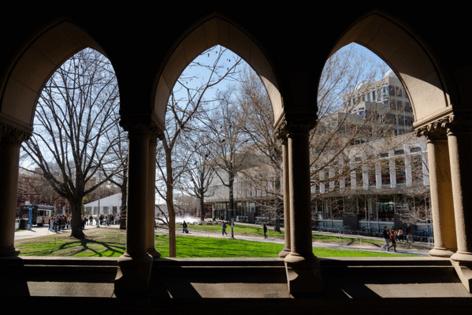Noah Feldman: Accreditation order is really about controlling what's taught
Published in Op Eds
President Donald Trump promised a “secret weapon” in his new executive order on university accreditation. Sure enough, it’s there, hiding in plain sight. The order includes an as-yet-unnoticed directive to the Department of Education to pressure the accreditors to push universities “to prioritize intellectual diversity amongst faculty.” In Trump-speak, that means hiring professors who teach what he and his followers believe to be true, regardless of what actual scholars might have demonstrated.
It’s a clear violation of the First Amendment for the government to tell universities who must be hired to teach based on their substantive views. The administration is presently trying to do that to Harvard University, my employer, cutting federal grants unless the university agrees to an external auditor who would review all departments and programs for “viewpoint diversity.” Harvard has appropriately made this outrageous violation of free speech a cornerstone of its lawsuit against the Trump administration.
The president is trying to achieve the same unconstitutional objective with his accreditation executive order.
Here’s how the system works: The accreditors are private companies, not part of the government. And in principle, any institution can teach students and award degrees and call itself a university — even if it’s not accredited. But the only way students can access Pell grants, subsidized loans and other forms of federal tuition support is if the college or university is accredited by a company that’s “recognized” as legitimate by the Department of Education.
As a result, the administration can pressure universities to do what it wants. It can also threaten accreditors that refuse to demand that universities do as it says with the loss of recognition. Should an auditor lose recognition, its accreditation wouldn’t be valid for purposes of allowing federal support for students at schools it has accredited. Students unable to obtain federal tuition assistance for a particular institution won’t go there — and without students (and their tuition), no college or university can survive long.
Of course, the accrediting companies, as well as the universities they accredit, can sue. They can argue, like Harvard has done, that forcing them to hire faculty they might not otherwise hire violates their free speech rights.
But the Trump administration will respond in court that it isn’t telling anyone what to teach. It will assert that it’s simply making the policy judgment that “intellectual diversity” is a prerequisite for a decent education. After all, it sounds reasonable in theory that the government should make sure its officially recognized accreditors are doing a good job.
You’ve got to give the Trump administration credit for its devious cleverness.
What makes the potential First Amendment claim against the executive order especially tricky to win is that accrediting decisions themselves necessarily involve the content of what colleges or universities teach. A university teaching the flat-Earth theory in geography or astronomy courses, for example, doesn’t deserve to be accredited. The accreditors aren’t neutral with respect to what is being taught. So, you might think it would be okay for the government to impose some substantive standards on the companies.
The reason this analysis is wrong is that the First Amendment has been interpreted by the Supreme Court to mean that the government can’t “prescribe what shall be orthodox in politics, nationalism, religion, or other matters of opinion.” It can’t pick and choose points of view when it’s providing a benefit like student loans and grants. So, it can’t mandate viewpoint or intellectual diversity. When the government recognizes an accreditor, it must only look neutrally at whether the accreditor is making sure the universities do a sufficient job of teaching according to professional standards. It can’t insist that those professional standards be changed to match the Trump administration’s political preferences.
It’s also complicated, and a bit confusing, that in principle there’s nothing bad about intellectual or viewpoint diversity in fields that rely heavily on normative judgments about the way the world should be rather than descriptive claims about the way the world is. A good law school or a good philosophy or art history department really should reflect multiple points of view. Multiplicity drives discussion and debate and teaches students to think for themselves and not accept any single point of view because it’s being taught by “all” the faculty.
The trouble comes when the government tries to force viewpoint diversity on institutions. Then, instead of relying on their own internal quality standards, universities become pawns in a political game. That never goes well for universities — or for the systems that allow governments to push them around.
____
This column reflects the personal views of the author and does not necessarily reflect the opinion of the editorial board or Bloomberg LP and its owners.
Noah Feldman is a Bloomberg Opinion columnist. A professor of law at Harvard University, he is author, most recently, of “To Be a Jew Today: A New Guide to God, Israel, and the Jewish People."
©2025 Bloomberg L.P. Visit bloomberg.com/opinion. Distributed by Tribune Content Agency, LLC.




























































Comments